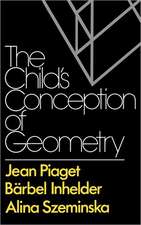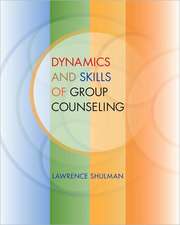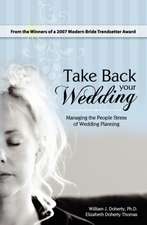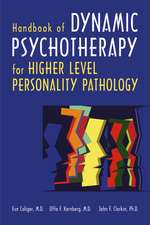Facilitating Emotional Change: The Moment-by-Moment Process
Autor Leslie S. Greenberg, Laura N. Rice, Robert Elliotten Limba Engleză Paperback – 27 ian 1997
While emotions are often given a negative connotation people are described as being too emotional or as needing to control their emotions this book demonstrates that emotions are organizing processes that enhance adaptation and problem solving. Within an experiential therapy framework, the volume shows how to work with moment-by-moment emotional processes to resolve various psychological difficulties. The first two sections introduce the process experiential approach to treatment. Exploring the interrelationships among emotion, cognition, and change, the authors develop a powerful, clinically relevant theory of human functioning. The third section, a detailed treatment manual, outlines the general principles and methods of therapy and provides step-by-step directions for six specific types of interventions. Excerpts from actual transcripts exemplify the various methods, illuminating the moment-by-moment process for both the client and the therapist.
Preț: 296.31 lei
Preț vechi: 311.90 lei
-5% Nou
Puncte Express: 444
Preț estimativ în valută:
56.72€ • 59.59$ • 47.66£
56.72€ • 59.59$ • 47.66£
Carte disponibilă
Livrare economică 19 februarie-05 martie
Livrare express 04-08 februarie pentru 33.19 lei
Preluare comenzi: 021 569.72.76
Specificații
ISBN-13: 9781572302013
ISBN-10: 1572302011
Pagini: 346
Ilustrații: illustrations
Dimensiuni: 152 x 229 x 21 mm
Greutate: 0.5 kg
Ediția:Revised
Editura: Guilford Publications
Colecția Guilford Press
ISBN-10: 1572302011
Pagini: 346
Ilustrații: illustrations
Dimensiuni: 152 x 229 x 21 mm
Greutate: 0.5 kg
Ediția:Revised
Editura: Guilford Publications
Colecția Guilford Press
Public țintă
Postgraduate, Professional, Professional Practice & Development, and UndergraduateCuprins
I. Introduction
1. Introduction to the Approach
2. A Process Facilitative Approach to Therapy
II. Theory: Emotion and Cognition in Change
3. Perspectives on Human Functioning
4. Towards an Experiential Theory of Functioning
5. Dysfunction
III. The Manual: Basic Principles and Task-Guided Interventions
1. Treatment Manual: The General Approach
6. Treatment Principles for a Process Experiential Approach
7. What the Therapist Does: Experiential Response Intentions and Modes
2. The Treatment Tasks
8. Systematic Evocative Unfolding at a Marker of a Problematic Reaction Point
9. Experiential Focusing for an Unclear Felt Sense
10. Two Chair Dialogue at a Self-Evaluative Split
11. Two Chair Enactment for Self-Interruption Split
12. Empty-Chair Work and Unfinished Business
13. Empathic Affirmation at a Marker of Intense Vulnerability
IV. Conclusion
14. Applying the Process Experiential Approach
15. The Process Experiential Approach: An Overview, Research, Theory, and the Future
1. Introduction to the Approach
2. A Process Facilitative Approach to Therapy
II. Theory: Emotion and Cognition in Change
3. Perspectives on Human Functioning
4. Towards an Experiential Theory of Functioning
5. Dysfunction
III. The Manual: Basic Principles and Task-Guided Interventions
1. Treatment Manual: The General Approach
6. Treatment Principles for a Process Experiential Approach
7. What the Therapist Does: Experiential Response Intentions and Modes
2. The Treatment Tasks
8. Systematic Evocative Unfolding at a Marker of a Problematic Reaction Point
9. Experiential Focusing for an Unclear Felt Sense
10. Two Chair Dialogue at a Self-Evaluative Split
11. Two Chair Enactment for Self-Interruption Split
12. Empty-Chair Work and Unfinished Business
13. Empathic Affirmation at a Marker of Intense Vulnerability
IV. Conclusion
14. Applying the Process Experiential Approach
15. The Process Experiential Approach: An Overview, Research, Theory, and the Future
Notă biografică
Leslie S. Greenberg, PhD, is Distinguished Research Professor Emeritus of Psychology and founder and former director of the Emotion-Focused Therapy Clinic at York University in Toronto, Canada.
Recenzii
Building on the experiential theories of psychotherapy developed by Rogers and Perls, as well as their own extensive work, Greenberg, Rice, and Elliott have written a highly sophisticated text. A valuable and unique feature is their effort to relate their approach to constructive information processing and the adaptive role of emotion in human functioning. Finally, the book contains a detailed manual of specific methods of therapeutic intervention. The work will predictably have a significant influence on theory, research, and practice in psychotherapy. --Hans H. Strupp, Ph.D., Vanderbilt University
Greenberg, Rice, and Elliott have written an immensely valuable book that deserves to be read by psychotherapists of all persuasions. It is theoretically innovative and clinically practical. Their view of emotional experience and its role in individual self-organization reflects a remarkable convergence of cognitive, constructivist, and psychodynamic perspectives, and it highlights the fact that effective therapists must be skilled in fencing and facilitating both subtle and intense experiences within the therapeutic encounter. Their treatment tasks give concrete and practical illustrations of what to do in a variety of common developmental dilemmas. Throughout the volume, the authors convey their own considerable sensitivity and clinical expertise. This is a major work in experiential psychotherapy and a wonderful contribution to psychotherapy process. --Michael J. Mahoney, Ph.D., University of North Texas
Drs. Greenberg, Rice, and Elliot have written an excellent treatment manual/graduate text book which details in admirable specificity the theory and procedures of a modern experiential psychotherapy. I would recommend this book to any of my colleagues who want to know the specifics of experiential psychotherapy. My students consistently rate this book highly. --Barry E. Wolfe, Ph.D., The Virginia Campus of the American Schools of Professional Psychology; Course: Client-Centered and Experiential Psychotherapy; advanced graduate students
-Greenberg, Rice, and Elliott have written an immensely valuable book that deserves to be read by psychotherapists of all persuasions. It is theoretically innovative and clinically practical. Their view of emotional experience and its role in individual self-organization reflects a remarkable convergence of cognitive, constructivist, and psychodynamic perspectives, and it highlights the fact that effective therapists must be skilled in fencing and facilitating both subtle and intense experiences within the therapeutic encounter. Their treatment tasks give concrete and practical illustrations of what to do in a variety of common developmental dilemmas. Throughout the volume, the authors convey their own considerable sensitivity and clinical expertise. This is a major work in experiential psychotherapy and a wonderful contribution to psychotherapy process. --Michael J. Mahoney, Ph.D., University of North Texas
Drs. Greenberg, Rice, and Elliot have written an excellent treatment manual/graduate text book which details in admirable specificity the theory and procedures of a modern experiential psychotherapy. I would recommend this book to any of my colleagues who want to know the specifics of experiential psychotherapy. My students consistently rate this book highly. --Barry E. Wolfe, Ph.D., The Virginia Campus of the American Schools of Professional Psychology; Course: Client-Centered and Experiential Psychotherapy; advanced graduate students
A very impressive book. It is practical, makes a significant contribution to theory building in psychotherapy, and is research based....contributes significantly to our understanding of the psychotherapy process. Readers with a hypnotherapeutic orientation, who traditionally explore with clients the domain where emotion, cognition, and behavior intersect, should find a treasure of concepts and practical interventions to extend their therapeutic repertoire.
--American Journal of Clinical Hypnosis, 11/3/1996Descriere
While emotions are often given a negative connotation people are described as being ""too emotional"" or as needing to ""control their emotions"" this book demonstrates that emotions are organizing processes that enhance adaptation and problem solving. Within an experiential therapy framework, the volume shows how to work with moment-by-moment emotional processes to resolve various psychological difficulties. The first two sections introduce the process experiential approach to treatment. Exploring the interrelationships among emotion, cognition, and change, the authors develop a powerful, clinically relevant theory of human functioning. The third section, a detailed treatment manual, outlines the general principles and methods of therapy and provides step-by-step directions for six specific types of interventions. Excerpts from actual transcripts exemplify the various methods, illuminating the moment-by-moment process for both the client and the therapist.

















